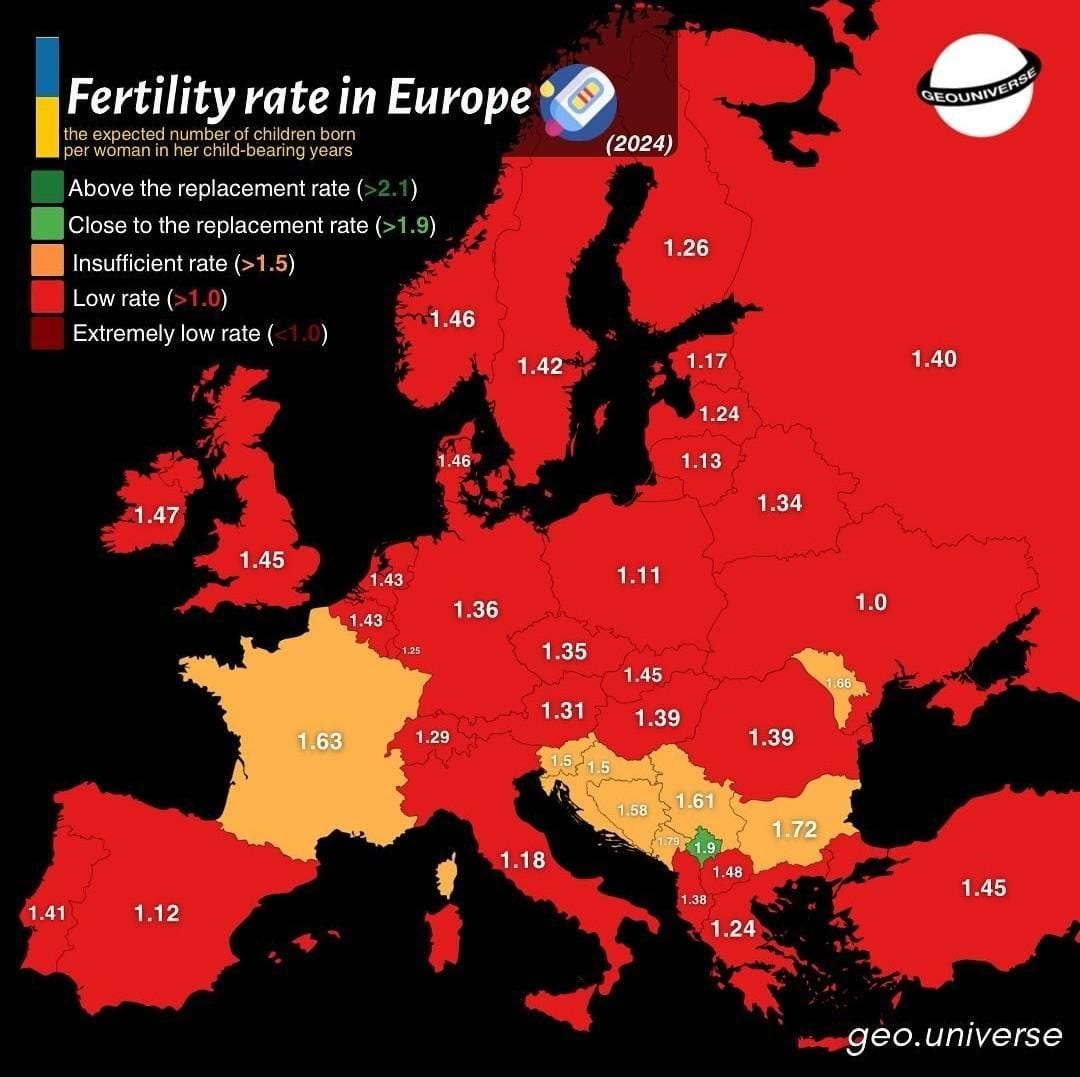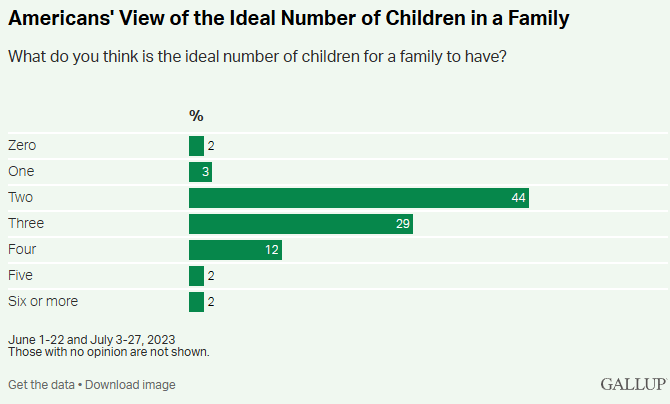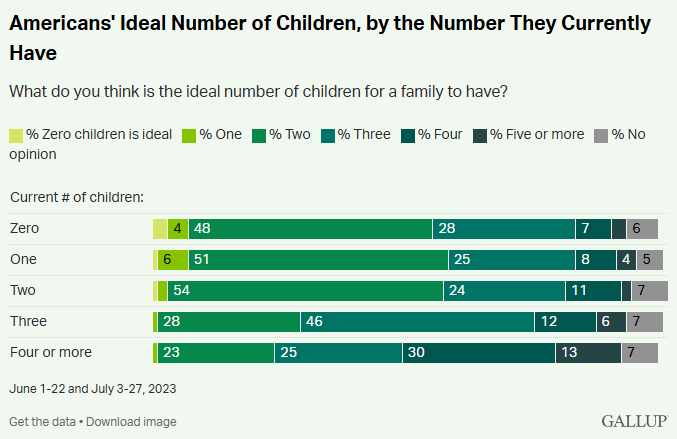The world is in a spiraling fertility crisis which everyone has notice over the last year-ish.1 Sarah Haider proposes a GI Bill for young moms. Scott Alexander says a govt payment of $200,000 per child should work. Everyone wants to go back to thick-community-style living.

Amid ever-increasing talk of what to do to increase fertility, I think it’s important we acknowledge that nothing will increase fertility to the levels required for our society to continue. People do not want more than one child. Some don’t even want one. Two children is viewed as a stretch goal. Three is a major sacrifice that one takes on for the good of their community. You cannot incentivize people to make that sacrifice at anything close to the proper scale because people don’t want money that badly. How many hands would you amputate for $100,000?
A Life Worth Living
One child is all you need to get 90% of the joy, meaning, and interesting experiences out of having children. There are massive diminishing returns to having additional children (for the parents). Ask all your friends. How many are excited and aiming for 3+ children? Really excited and joyously motivated—not because it’s their duty for humanity and they’re on the EA burnout path. The life worth living is one with one child per couple among happy couples. Or 1.35 on average when you count the outliers.
Why yes, I’m fixated on 3+. One child is a death sentence. Two ““should”” be enough, but it’s not. “Two” doesn’t mean what it used to. Now four births lead to two reproducing children, on average. My parents have four children, but they have two grandchildren. Three of us are childless (hi!), one has two kids. If my parents are lucky that might increase to three grandchildren.
Just as premodern couples had to accept half their kids wouldn’t live to adulthood, we have to accept half our kids won’t reproduce. This means three children as a minimum goal is the only way to begin to attain replacement fertility. Parents should be hoping for more than three, but wanting three as their starting baseline.
Yes, agreed: lmao
Don’t Summon Eldritch Gods
So—we can’t fix this with money, people don’t want it badly enough. We can’t fix this by altering our culture, every other force in society is arrayed against it. A complete culture-ectomy could work, akin to passionately converting to a new religion and moving to their ethnostate-ish region. But no one wants that either. Fertility will not recover to replacement rates and we must all prepare for that.
Why care if evolution will fix this?

Because I don’t care about “humanity in general” nearly as much as I care about my society. Yes, sure, the descendants of the Amish and the Taliban will cover the earth. That’s not a future I strive for. I’d be willing to give up large chunks of the planet to an ASI to prevent that. I want the future to have a robust rationalist society of humans I relate to and care for. For the humanity I care about fertility will never recover. Don’t summon up eldritch gods to fix your problems, you’ll never be happy with the result.
Pull The Rope Sideways
Fortunately we’re at the dawn of the singularity and as Scott pointed out, though Society Is Fixed, Biology Is Mutable. We won’t die out if we don’t die. The most feasible solution I see is honestly the banishment of aging and death. We don’t need to dedicate our collective lives to grinding out 3+ children before it’s too late and cursing our children to do the same. We can just not die and retain our culture that way. If we want to have another child every century or so, there will always be a happy rationalist society to welcome them and celebrate their growth and uplift.
Not Dying is the true frontier in preventing demographic collapse, and the loss of the society we care about. Short of that we’re doomed.
Yes, lots of people started ringing alarm bells about this well before that (it’s nice being in the rationalist community and always learning about what’s going to happen 20% sooner than the rest of the world), but it’s really taken off lately.


Some people don't want to have children. It is not a problem as long as the people who want to have more children are allowed to do so. I know people who don't have children, but whose siblings have four or more.
It becomes a real problem when the people who want to have three or more children are not allowed to do so.
One problem is the society telling people that there is always enough time to have children later. Denying the fact that after some age, it becomes difficult to conceive a child. This problem is typically stronger for women, which is why if you mention it, you will be immediately accused of sexism. (The logic is: only a sexist would be motivated to talk about something that is mostly a women's problem.) So everyone is told to wait as long as possible. Then some people find out they no longer can have children. Yeah, modern medicine can do miracles. But they are expensive, they hurt, they take a lot of time, and you probably don't want to get three or more children that way. Even the people who have children at last moment sometimes have fewer than then originally wanted, because you typically don't want to have many children at the same time. I guess this is individual, but anecdotally, I know some people who had two kids, decided that it was too much work and therefore enough, but about ten years later changed their mind and had a third child. But if you have your first children at the last moment, you won't get the opportunity to change your mind ten years later.
We need to be able to give your people the same advice that the generations before us received: If you don't have your first child at the age of about 30, the biology will very likely prevent you from having as many children as you would want to have. (Yes, I said 30; not 40, and definitely not 50.)
Another problem is the social brainwashing telling us that the meaning of life is either to work hard to make your bosses rich, or to spend a lot of time partying and drink a lot of alcohol. I mean, there is a place and time for everything, but at some moment, even the partying gets boring. But you don't know what else to do, because everyone keeps telling you that having children is the worst fate that could befall a young human. (Typically done in a motte-and-bailey fashion, where you first tell an anecdote about someone getting pregnant at 16 and thereby ruining their life, because in this story their partner abandons them... and when the lesson is internalized, you suggest that getting pregnant at 25 or 30 is practically the same thing, only instead of education it ruins your career.)
And hey, people are different. For some, endless partying really is the meaning of their lives. Others genuinely want to make their bosses rich, hoping that some of that wealth will trickle down to them. And there is nothing wrong with that. But there are many of us who merely pretend that making our bosses rich makes our lives fulfilling, when instead, we would secretly prefer to spend the time with our friends and loved ones. (But obviously you can't say that out loud, if you want to pass the job interview; at least as a software developer there is the cultural expectation that coding is all you care about, which is why you are supposed to have a portfolio on GitHub to prove that you also spend your free time coding and learning the latest technologies.)
The cost of having children also scales sublinearly. (Which you will never find out, if you stop at one.) One child will depend on you all the time, because there is no one else at home to interact with. Two children can play together. Older siblings can take care of younger siblings; they can teach them many things. (Those who were the only children of their parents probably don't realize that taking some responsibility for your younger siblings is a natural part of childhood for most of humanity. I suspect it might even prepare you for being a parent later.) Cooking for two children does not require more time than cooking for one (unless they have food allergies).
(Anecdotally, when I look at people around me, those with more children seem happier than those with one. But the causality probably goes in the other direction -- if your first child has serious health problems, or if your partner abandons you after your first child is born, you are less likely to have more children.)
If you have multiple children, they are not copies of each other. If you had two or more children, you will probably find the idea of humans being born as blank slates not just wrong, but laughably silly. (I suspect we get a lot of nature denial precisely because most people participating in the debate do not have children of their own, or stopped at one.) I was there when my two children were born, and they were dramatically different from the first moment. So, having more children is not just more of the same thing. It is a new experience.
There are also costs that scale linearly or worse, but those are often society's choices. Consider education, which is mostly glorified childcare. If you hired a babysitter for your child, you wouldn't need to hire 2 babysitters for 2 children, and 3 babysitters for 3 children. If you wanted your children to learn programming, it makes a lot of sense to simply teach the oldest one and let them teach the younger siblings, and only intervene if they get something wrong or can't explain something, in which case even the oldest one benefits from the clarification. But the school system disrupts this natural passing of knowledge to younger siblings, and insists that the costs of educating N children must be exactly N times the costs of educating one. (If homeschooling is legal in your country, you could send the oldest child to school and let them teach their younger siblings at home... but then the younger siblings wouldn't get the credentials, and those are often more important than the knowledge.) The rules for car seats make having more kids expensive and inconvenient beyond linear.
What is worse, the later people have children, the more intolerant the society becomes against children and those who have them. Some people get hysterical about breastfeeding in public. People get fired from their jobs for suggesting that the easiest way to have more women in STEM is providing more part-time jobs -- but that is exactly what needs to be done, if you want two people to keep their jobs while having a small child. (How many women with small children are working at Google? Do their children ever see their parents, except shortly before bedtime? What happens when the children get sick?) People sometimes talk about ageism... but I suspect that maybe half of that is ageism per se (discriminating against older people regardless of whether they have children or not) and the other half is about having children (which correlates with age, especially in cultures where young people delay having children). For example, if your company is advertised as "young and dynamic", I expect that the company culture includes a lot of unpaid overtime... which you won't get from someone who needs to pick up their kids from school. All that talk about how "we don't really want people who don't deeply care about the company and only work 9-5 and then leave" may sound inspiring to some naive young people, but my brain translates it as "we don't want people who have families (or hobbies)".
People who have one child probably make it more expensive for people who want to have more children, by increasing the social norms about how much money and time one should spend per child. For example, in certain bubbles is it considered cool when schools have various projects and after-school activities where the parents are expected to participate. Sound nice, but now imagine it multiplied by four.
Huh? I don't know anyone like that. I have a problem even imagining a person like that.